#however this post is about dystopias and dystopian media borrowing themes from each other
Text
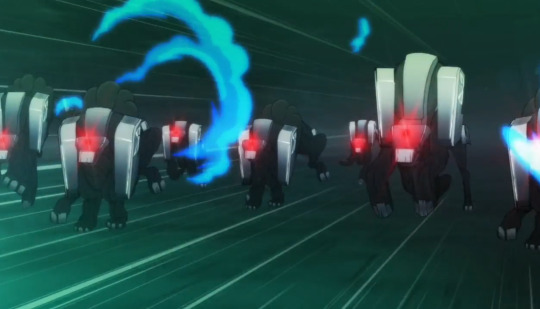
hey. hey did yall notice smthn interesting about the kane dogs in the show and the mechanical hounds in fahrenheit 451? :)
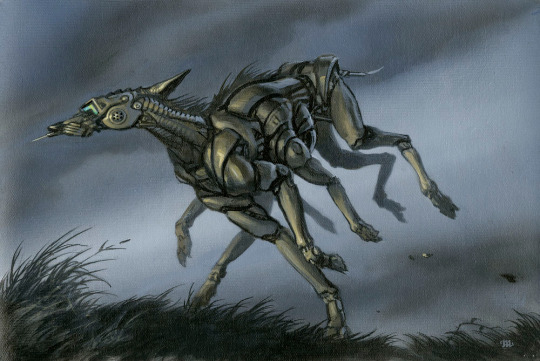
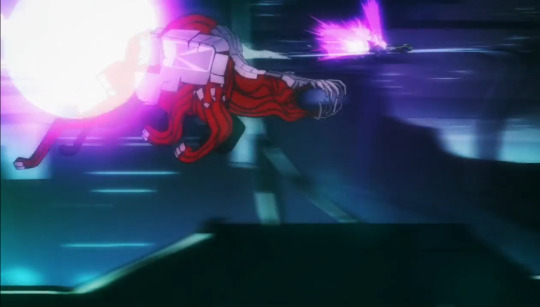
especially the energy boosted kane dog? especially especially bc it grew an extra set of legs?
ya wanna know what else is interesting?
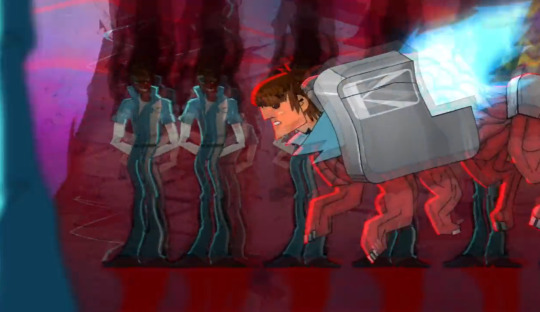
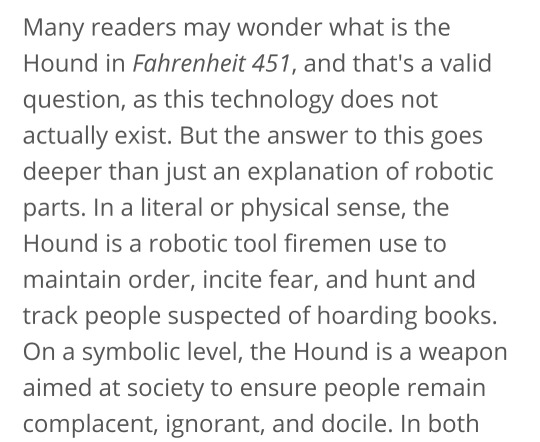
:)
#motorcity#mine#isnt that just fascinating#ofc im not pointing out anything new wrt mike and his past#we already know kane used him to... enforce deluxes interests on motorcity#and the writers even hinted that mike leading the demo crew That Fateful Day wasnt the only time he'd ever been down in mc#we could get into what mike did in mc exactly that has him feelin so guilty. we could speculate for hours even#however this post is about dystopias and dystopian media borrowing themes from each other#in order to teach each generation about dystopian fascist topics#and to see this in a kids show too :') wow#the writers did a fantastic job of weaving this particular character into this show#bc i deadass did not pick up on this until a yt vid i was watching one day mentioned mechanical hounds i think#idk but since bradburys novel is kinda trending again lately im sure it was smthn that brought it up to my attention#but yeah wow#high fives @ the writers for this thread being woven into a kids show about racing cars and beating dictators#from a novel in the 1950s nonetheless LOL
19 notes
·
View notes
Text
Punk Genres and Potential Problems
This post is inspired by this very long reblog chain about punk genres, definitions, and issues. It's one of those 'my buddy is confused but he's got the spirit' posts, i.e. not completely wrong, some things right, excellent points, and some flaws stemming from inaccuracies and...whatnot. Instead of piling onto that post I'm writing up a brand new post for people to reblog and disagree with. This is based 98% on my own academic research into these genres. The remaining 2% is Opinions. (That's a lie. Academic Research to Opinion ratio is more like 60/40.)
There are even sources! Because sources are GREAT. They are under the cut.
SCIENCE FICTION
The -punk genres are subgenres of science fiction, science fiction being…well, as hard to define as its subgenres. This in no way makes it difficult to write academic papers about this shit.
One of the earlier definitions put science fiction (from now on, SF) as a didactic and progressive literature with emphasis on science; a literature about science for science, with scientific methodology (Stableford:2015). As the discussion for SF definitions has progressed, so has discussion about what the correct term should be; speculative fiction (Merril:1971:60) and structural fabulation (Scholes:1975:29) have been contenders. Today science fiction and speculative fiction are used interchangeably.
There's no consensus on how to define SF (Westfahl:1998, Stableford et al:2015), though a bunch of people have tried, such as Damon Knight, who famously said: "Science fiction is what we point to when we say it." (Clute:1995:314), and Gary Westfahl, who proposed that "A work labelled science fiction has these three features: it is a prose narrative with scientific language and non-realistic subject matter – or any two of these three features." (Westfahl:1998:299).
The Oxford Dictionary of Science Fiction defines SF like this:
"A genre (of literature, film, etc.) in which the setting differs from our own world (e.g. by the invention of new technology, through contact with aliens, by having a different history, etc.), and in which the difference is based on extrapolations made from one or more changes or suppositions; hence, such a genre in which the difference is explained (explicitly or implicitly) in scientific or rational, as opposed to supernatural, terms." (Prucher:2009:171.)
In the words of Tom Shippey, however, SF "is hard to define because it is the literature of change and it changes while you are trying to define it." (Jakubowski & Edwards:1983).
WELL ISN'T THAT NEAT? :D SF is what we point to when we say it, as changeable as the weather, and most probably, is about science or a setting different from ours through science.
So, on to the -punk genres. I'm listing them below in a somewhat chronological order of invention. First a brief overview, and then I'll do in-depth bullets about cyberpunk, steampunk, dieselpunk, and solarpunk, as those are the -punk genres I'm most familiar with.
Cyberpunk, which concerns itself mostly with a dystopian society in which humans access cyberspace by way of cybernetics.
Biopunk, a close cousin of cyberpunk that deals with consequences of human and genetic experimentation and biotechnology (Michaud:2008:53). The main difference between biopunk and cyberpunk is that biopunk modifications have nothing to do with cyberware and cyberspace, but only genetic and biological manipulation.
Steampunk, which is retro-futuristic alternative history fiction that reimagines history and science based on an alternative universe in which the industrial revolution did not happen (or happened differently), and in which steam based science evolved. Steampunk is rooted in the politics of the Victorian era as well as aesthetic - fashion, architecture, etc.. Steampunk rarely extends beyond the Victorian era. (Guffey & Lemay:2014, Booker:2015:290.)
Dieselpunk, a close cousin of steampunk in that it is also retro-futuristic alternative history fiction, but unlike steampunk, dieselpunk accepts the industrial revolution and focuses on dieselpowered technology. (Guffey & Lemay:2014.)
Solarpunk, a new eco-futuristic political movement that has produced little literature so far. In literature it is SF that is either retro-futuristic fiction that reimagines an alternative history in which the industrial revolution did not happen, or evolved into a different direction, or futuristic fiction in which the current environmental issues have been solved. In a solarpunk universe, the world has become solar- or windpowered, ecological and sustainable. (Lodi-Ribeiro:2014.)
Many more, such as decopunk, clockpunk, atomicpunk, and so on. All the -punk subgenres are typically considered cyberpunk derivatives, in that they are either inspired by elements of cyberpunk or have borrowed the -punk suffix to allow twisting and mixing. They focus on a certain aspect of technological advancement and its consequences, whereas SF as an overarching genre is free to do whatever it wants within the realm of a) prose narrative, b) technological advancement ("scientific language") and c) non-realistic subject matter, if going by Westfahl's definition of SF.
CYBERPUNK
In cyberpunk, the advanced technology is very often biotechnology; technology that alters the human body or mind, for example brain implants that allow the human mind access to the internet, or cyberspace. In addition to this, the life quality of the characters in a cyberpunk story tends to be very low. Cyberpunk represents a future in which humans are subject to ruthless digital and technical communications networks and have lost the human connection to each other (Cavallaro:2000:xv). Cyberpunk is by nature a dystopian genre by virtue of its themes and discussions, which often revolve around the potential downfalls of technological advancement. Important to note here is that cyberpunk as a genre was born in the early eighties, at the beginning of the technological boom. Internet, cell phones, microchips and bionic prosthetics were all new things under development, and so it would be very easy to conclude that the genre was also in part born out of fear of the unknown. The - punk part of the term was taken directly from 1970s rock'n'roll terminology, punk in this context meaning young, aggressive, streetwise, and alienated, and offensive to the Establishment. In the early 1980s the term cyberpunk was coined by writer Bruce Bethke, and the term came into common use via William Gibson's Neuromancer (1984). (Nicholls:2015a.)
Non-exhaustive list of themes:
Punk disillusionment, sometimes with layers of illusions being peeled away as the story progresses
The loss of human connection and/or the decline of the human condition
Media overload, massive data networks and density of information
Destructive sex, often in connection with the lack of ability to form human connections
Bodily metamorphosis and/or body modifications that lead to transhuman and posthuman themes.
A dark, gritty and post-industrial global setting, often megacities, that further overshadow the protagonist and emphasise their position in society
Heavy substance use & addiction
Hopelessness – the protagonists nurture no hope of getting out of their predicament and/or do not succeed
Disregard for human life
(Burrows & Featherstone:1996; Elias:2009:3; Shiner:1991; Hollinger:1990; McHale:1992; Murphy & Vint:2010; Shiner:1992; Slusser:1992; Cavallaro:2000, Lavigne:2013:11-16.)
In addition to these, cyberpunk themes very often also overlap with postmodernist themes such as:
"lost in the city" themes of lack of identity
An increasingly fractured and globalised society
The loss of meaning or a higher order, religion is non-existent and there is no god or other higher authority to whom one can turn for answers
Deconstruction. It can be argued that cyberpunk in itself is a deconstruction of utopian SF narratives – the utopia of SF is often the dystopia of cyberpunk.
(McCaffery:1991: 315-316; McHale:1991; Heuser:2003; Woods:1999:65-66.)
Now, cyberpunk was coined by a bunch of cishet white dudes in a single writer's circle, who just wanted to look really cool. (See the Mirrorshades anthology and it's editor, who was the one who most wanted to be cool.) The same dudes have now declared this genre dead and that it is no longer active as a productive genre, albeit having been a refreshing spark and fresh point of view within SF history and SF literature (Nicholls:2015a). To that I say: bullshit! Genres don't just 'die', and don't just 'stop being productive' - let me refer you back to the definition of SF as a something that changes as you try to define it.
Consider this: in the 80s a bunch of dudebros wrote stories about the danger of technology and the internet while also writing about anti-heroes fighting the establishment (none of these dudebros were actual punks, they were decidedly middle-class to upper middle-class who circle-jerked each other in their writing workshops on the regular and wore sunglasses with mirror-finish). In the 90s the new technology wave didn't really seem all that dangerous anymore, and wasn't the internet and the cellphones awfully convenient? And who cares about Monsanto and Nestlé when we can get cheap flour and coca-cola whenever we want it? And by the 21st century, well, these dudebros are old, likely haven't kept up with their own genre because they're stuck with whatever they thought was genius in the 80s, and technology is everywhere. Also, Japan did not become the technological mega-corporate superpower that they thought it would be in the 80s, and we don't live in a Judge Dredd society, so ¯\_(ツ)_/¯ , basically.
Here's some examples of cyberpunk works:
Mirrorshades anthology (1986) (https://en.wikipedia.org/wiki/Mirrorshades)
Neuromancer, Gibson (1984)
Blade Runner (1982)
Ghost in the Shell (1995)
The Matrix (1999)
Surrogates (2009)
Dredd (2012)
Elysium (2013)
Lucy (2014)
Hey look at that, four movies on this list from the 21st century, but I guess cyberpunk is really dead, guys? How sad Alexa play despacito
Potential problems
There's always a risk that in creating a cyberpunk story that one accidentally ends up writing about sentient fedoras instead of actual anti-heroes fighting against real injustice. If your story is about incels, you're doing cyberpunk wrong.
No really, that's it.
STEAMPUNK
I have no sources for this section because I've not covered steampunk in my own academic research, it's just one of those genres I really like to read recreationally. I have read academic articles about steampunk, but do I have them saved? No, absolutely not. That would be rational, useful, and effective, and that's not how we do things in this household.
That said.
Steampunk is a subgenre of SF that falls under ALTERNATIVE HISTORY rather than COOL FUTURE STUFF. It's retro-futuristic type of science fiction inspired by the likes of Jules Verne, who wrote science fiction in the 19th century. What's characteristic for Jules Verne and other SF writers of the same era, is that they imagined technological development based on the science they had at the time, which is why so many of their inventions are steam powered (coal). They had all these grand ideas (and big imaginations) for what humanity could achieve, but didn't have anything more advanced than coal, steam, and electricity. They didn't know that there was an entire digital revolution waiting to happen in the 20th century, so everything was analogue.
In addition to that, the 19th century still had like, this ginormous British Empire. There were colonies everywhere, French, British, Spanish, Dutch, Portuguese, Danish--Europeans were stealing lands and killing people (and enslaving them, still). Imperialism was in vogue and the tea, sugar, and opium trade was the highlight of capitalism at the expense of the entire rest of the world.
The modern steampunk genre as it's written today is...based on all that. So you have a genre that's aesthetic as fuck (cogwheels everywhere, amiright?), in a sort of nostalgic way where everyone has on pretty dresses, the technology is adorably analogue, there's steam! Steam is pretty! Science as we know it is disregarded for the Rule of Cool, and some writers even throw in supernatural elements because why the fuck not, and the Victorians were into it anyway.
The steampunk genre was not created to be -punk. It is not inherently rebellious, it doesn't feature a fight against the establishment, it doesn't have anti-heroes, it doesn't really have anything about it that pokes at the status quo of its time (the Victorian era). It was dubbed steampunk because cyberpunk was a term that existed, and it looked cool to model the name of a new subgenre after another one, that clearly set it apart from 'traditional' SF, but also made it clear it was different from cyberpunk.
Potential problems:
The genre as a whole.
I'm not joking.
So, how do you avoid the problem that is steampunk?
De-colonise the narrative* (er, probably don't do this if you're white.)
Whatever you do, make sure you're not accidentally glorifying imperialism and colonialism.
Write stories that subvert the steampunk genre as it's popularly known--go beyond the Victorian era - what does a steampunk world look like that prevailed until 2018? What happened to the British empire in that world? Is it still around? Did it collapse? What role did tech play in it? *who* has the tech - the British empire, or the nations it colonised? What does that mean for history? Who's the hero and who's the establishment? Where is the injustice and who is fighting it?
Steampunk is often known as a fluff genre, where the characters just get to go on adventures and have fun. Drink a lot of tea, eat a lot of food, etc. (Hello, Gail Carriger) There's nothing wrong with fluff, but consider: at whose expense do we get the fluff? Just to take Gail Carriger's steampunk books as an example, her characters frequently exhibit a privilege that only comes with the fact they are British citizens in a British empire.
Examples of steampunk works:
Twenty-Thousand Leagues Under the Sea, Verne (1870) (you didn't think I was going to forget Jules Verne, did you?
The Time Machine, Wells (1895) (most people would say it's SF, but I'm adding it here because of when it was written and the faux science)
Infernal Devices, Jeter (1987)
The Difference Engine, Sterling & Gibson (1991)
The Golden Compass, Pullmann (1995)
Steampunk and Steampunk Reloaded anthology (2008) edited by Ann and Jeff Vandermeer
The Boneshaker, Priest (2009)
The Revolutions, Gilman (2014)
Gail Carriger's Parasolverse (on-going)
The City of Lost Children (1995)
Atlantis: The Lost Empire (2001)
Treasure Planet (2002)
League of Extraordinary Gentlemen (2003)
Van Helsing (2004)
SteamBoy (2004)
Abraham Lincoln: Vampire Hunter (2012)
*this, I'd argue, is how we get e.g. afropunk and silkpunk. :D :D :D i don't mean that afropunk and silkpunk are steampunk under a different name, i mean that those genres are about de-colonising the narrative; alternative history free of western intervention. It's SUPER COOL STUFF, and you should all read it. (As should I.) Ken Liu and JY Yang do silkpunk. Unfortunately I don't know much afropunk, though I do know Black Panther (2018) is an example of afropunk.
DIESELPUNK
Oh man am I READY for this hot mess.
Dieselpunk is another ALTERNATIVE HISTORY subgenre, characterised by being set between WW1 and WW2, when dieselpowered technology was the main technological focus. Dieselpunk fiction sometimes extends into the 1950s and early 1960s, and in those cases often discusses alternative histories in which the Nazis won the war or the post-apocalyptic reality following a nuclear war or other major human-made disastrous event. The term dieselpunk was coined in 2001 by Lewis Pollak and Dan Ross, when they needed to describe the aesthetic of their new game which was steampunk-esque, but darker and grittier than steampunk. Dieselpunk was a world of grit, oil, dust and mud, but also borrowed elements from Art Deco, Dadaism, Cubism, and Futurism, amongst others. (Ottens & Piecraft:2008.)
I have a love-hate relationship with this genre, because there are TWO strands of dieselpunk, and, if you've spotted it already, one of them is about nazis winning and the other is about nazis losing. Guess which one I like? If your answer is 'the one where nazis lose' you are right, gold star for you. I'll be citing a lot from Ottens and Piecraft in this section because there is shockingly little academic research done on dieselpunk. Nick Ottens and Mr. Piecraft are two dudes who like dieselpunk who sat together ten years ago to talk about a definition, and published it in a webzine. It's important to note that Mr. Piecraft is a screenname, and that Piecraft himself is a nazi-sympathiser if not an outright nazi (honestly, what's the difference between nazi-sympathiser and nazi? none). Ottens, on the other hand, uses his own name because he's not a fricking nazi.
So, about those two strands. Let's deal with the nazi first so we can proceed to ignore it for the rest of this post.
Themes of the Piecraftian strand:
Continual dystopian view
The aesthetic of world wars
World War 2 is either being fought as a prolonged cold war or has been won by the Axis powers
Often suggests Nazi-Germany has advanced rocketry and aeroplane programs
Eugenics
The lack of development of human culture due to widespread warfare
In the case of a post-apocalyptical event, survival being largely dependent on diesel power
The occult or supernatural
Often no hope for recovery, survival or a better future
(Ottens & Piecraft:2008)
Y I K E S. just. YIKES.
Themes of the Ottensian strand:
Settings in which the decadent aesthetics and utopian philosophies of the Roaring Twenties continued unhindered by economic collapse or war
The Great Depression did not happen, sometimes World War 1 didn't either
Enthusiasm for the predictions about the future produced throughout the 1930s and 1950s
Positive visions of dieselpowered technology, often realising utopian ideals of technology fairs at the time
Unstoppable technological progress; however the technology almost never crosses the boundary between dieselpowered machines and sophisticated computer technology
Nuclear weapons only an experimental technology
Firmly set in the interwar era and does not incorporate World War 2
Pulp-inspired adventure
Always carries a glimmer of hope
(Ottens & Piecraft:2008)
Dieselpunk is sometimes considered a post-cyberpunk genre within the "Ottensian" tradition, as it may offer a utopian view of the progression stated in a pre-WW2 environment as a counterpoint to the dystopian world views of cyberpunk; dieselpunk as a genre is not just newer than cyberpunk, it showed up right on the heels of cyberpunk. Dieselpunk is also sometimes considered a post-steampunk and pre-cyberpunk genre timeline-wise, as the universe of the "Piecraftian" dieselpunk tradition may eventually turn into a cyberpunk universe with the progress of time and technological advancement, and was in fact considered a continuum between steampunk and cyberpunk by game designers Pollak and Ross. Another view is that dieselpunk fiction can be likened to cyberpunk stories set in the Roaring Twenties instead of in the near future as both cyberpunk and dieselpunk take inspiration from film noir in their storytelling and aesthetic look. (Ottens & Piecraft:2008; Buckell:2015; Feinstein:2014; Wilson:2013.)
I personally think that dieselpunk has a lot more in common with cyberpunk than with steampunk, even though dieselpunk and steampunk are often lumped together. It's easy to see why they are, as both steampunk and dieselpunk are highly aesthetic genres, they're both alternative history, they both have nostalgic elements (e.g. victorian fashion, 20s-40s fashion), and they both lack the true -punk aspect of the genre: the fight against the establishment. At least where the Piecraftian strand is concerned, as that isn't so much about fighting the establishment as it is about glorifying fascism. The Ottensian strand, while 'fluffier', and pulp-ier, definitely has a clear anti-nazi thread--the heroes in pre-WW2 or WW2 stories are explicitly fighting the nazis, not aiding them.
Examples of dieselpunk works:
Indiana Jones and the Raiders of the Lost Ark (1981) (Bet you didn't see that one coming)
The Sky Captain and the World of Tomorrow (2004)
Captain America: the First Avenger (2011) (YES, REALLY. IT IS DIESELPUNK.)
Mad Max: Fury Road (2015)
Potential problems:
THE ENTIRE PIECRAFTIAN STRAND OF DIESELPUNK, HONESTLY
DON'T BE A PIECRAFT
BE CAPTAIN AMERICA
PUNCH A NAZI
SOLARPUNK
Hey look, it's my favourite -punk genre! It's my favourite because it's so new and undefined and malleable and we can make it ANYTHING WE WANT, without old dudebros breathing down our necks. (No doubt they will still be breathing down our necks, but fuck them. FUCK THE ESTABLISHMENT.)
Solarpunk is a new eco-futuristic political movement that has produced little literature so far. It's usually characterised by either retro-futuristic fiction that reimagines an alternative history in which the industrial revolution did not happen, or evolved into a different direction, or futuristic fiction in which the current environmental issues have been solved. In a solarpunk universe, the world has become solar- or windpowered, ecological and sustainable. (Lodi-Ribeiro:2014.)
Some credit the solarpunk movement to this post on tumblr from 2014, but the term and the concept had been around for at least two years by then. The post can however be given some credit regarding spreading the concept and spotlighting it in a visually appealing way. Because of this post, many define solarpunk as art noveau + plants, which, to be fair, is a very aesthetic rendition of the concept, but like I said: this is a brand new genre, it's malleable, we are still in the process of defining it. And we likely never will be 'finished' defining it, as I remind you yet again that science fiction is the literature of change, and it changes while you define it.
I imagine that the -punk part of solarpunk isn't solely because all those other established genres use that naming model, but because we live in a society that still relies heavily on fossil fuels, and we are living a global climate crisis that will only be worse if we don't take action. Solarpunk takes that and goes 'what if we didn't have that problem in the first place?' and imagines a world where we didn't become reliant on fossil fuels, where we as a species invented and used sustainable sources of power (wind, solar, water) from the get-go. Or it imagines a world where we averted the crisis, where fossil fuels were replaced by renewable energy. I like this genre because it speaks to the part of me that is passionate about the environment and sustainable energy (like, come on, I live in Denmark, the land of wind power), and because parts of our society are, in fact, solarpunk. So one could say the genre is fighting against the establishment we live in (the governments that don't sign environmental treaties, governments that keep digging for oil instead of investing in sustainable research, governments that approve fracking, governments that roll back laws that protect the environment) by presenting an alternative, but I'd like to think that in fiction we'll also eventually have heroes fighting for the environment.
Examples of solarpunk works:
Solarpunk: Ecological and Fantastical Stories in a Sustainable World Anthology (2012, translated into English in 2018)
Sunvault: Stories of Solarpunk and Eco-Speculation Anthology (2017)
Glass and Gardens: Solarpunk Summers Anthology (2018)
The Broken Earth Trilogy, Jemisin (I have yet to read it, but others have described it as having solarpunk elements)
Potential problems:
I don't? know? yet?
??
SOURCES:
BOOKER, M. Keith. Historical Dictionary of Science Fiction in Literature. Rowman & Littlefield, 2015.
BUCKELL, Tobias S.. Introduction. The Mammoth Book of Dieselpunk. Ed. Sean Wallace. Hachette UK, 2015.
BURROWS, Roger & Mike FEATHERSTONE. Cultures of Technological Embodiment: An Introduction. Cyberspace/Cyberbodies/Cyberpunk. Sage Publications, 1996.
CAVALLARO, Dani. Cyberpunk and Cyberculture: Science Fiction and the work of William Gibson. The Athlone Press, 2000.
CLUTE, John & Peter NICHOLLS. The Encyclopedia of Science Fiction. 2nd edition. St. Martin's Griffin, 1995.
ELIAS, Herlander. Cyberpunk 2.0: Fiction and Contemporary. LabCom Books, Portugal. 2009.
FEINSTEIN, Katriona. Dieselpunk: Retro Futures of the All-American Art Deco Years. Graffito Books Limited, 2014
GUFFEY, Elizabeth and Kate C. LEMAY. Retrofuturism and Steampunk. The Oxford Handbook of Science Fiction. Ed. Rob Latham. Oxford University Press, 2014.
HOLLINGER, Veronica. Cybernetic Deconstructions: Cyberpunk and Postmodernism.
Mosaic 23, January 1990.
JAKUBOWSKI, Maxim & Malcolm EDWARDS (ed.). The Complete Book of Science Fiction and Fantasy Lists. HarperCollins, 1983.
LAVIGNE, Carlen. Cyberpunk Women, Feminism and Science Fiction: A Critical Study. McFarland, 2013.
LODI-RIBEIRO, Gerson. Prefácio. Solarpunk. Editora Draco, 2014.
MCCAFFERY, Larry. Cutting Up. Storming the Reality Studio: A Casebook of Cyberpunk and Postmodern Science Fiction. Duke University Press, 1991.
MCHALE, Brian. POSTcyberMODERNpunkISM. Storming the Reality Studio: A Casebook of Cyberpunk and Postmodern Science Fiction. Duke University Press, 1991.
MCHALE, Brian. Towards a poetics of cyberpunk. Constructing Postmodernism. Routledge, 1992.
MERRIL, Judith. What Do You Mean: Science? Fiction? SF: The Other Side of Realism. Editor Thomas D. Clareson. Popular Press, 1971.
MICHAUD, Thomas. Science Fiction and Innovation. Marsisme.com, 2008.
MILBURN, Colin. Posthumanism. The Oxford Handbook of Science Fiction. Ed. Rob Latham. Oxford University Press, 2014.
MURPHY, Graham J. and Sherryl VINT. Introduction: The Sea Change(s) of Cyberpunk. Beyond Cyberpunk: New Critical Perspectives. Routledge, 2010.
NICHOLLS, Peter. Cyberpunk. The Encyclopedia of Science Fiction. Eds. John Clute, David Langford, Peter Nicholls and Graham Sleight. Gollancz, 10 Apr. 2015. Web. 3 Nov. 2015. a
http://www.sf-encyclopedia.com/entry/cyberpunk.
NICHOLLS, Peter. Cybernetics. The Encyclopedia of Science Fiction. Eds. John Clute, David Langford, Peter Nicholls and Graham Sleight. Gollancz, 10 Apr. 2015. Web. 3 Nov. 2015. b
http://www.sf-encyclopedia.com/entry/cybernetics.
NICHOLLS, Peter, and John CLUTE. Genre SF. The Encyclopedia of Science Fiction. Eds. John Clute, David Langford, Peter Nicholls and Graham Sleight. Gollancz, 2 Apr. 2015. Web. 11 Nov. 2015.
http://www.sf-encyclopedia.com/entry/genre_sf.
OTTENS, Nick & Mr PIECRAFT: Discovering Dieselpunk. The Gatehouse Gazette, July 2008. Web. 31 March 2016.
http://www.ottens.co.uk/gatehouse/Gazette%20-%201.pdf
PRUCHER, Jeff (editor). Brave New Words. The Oxford Dictionary of Science Fiction.
Oxford University Press, 2009.
SCHOLES, Robert E. Structural Fabulation: An Essay on Fiction of the Future. University of Notre Dame Press, 1975.
SHINER, Lewis. Confessions of an Ex-Cyberpunk. New York Times Op-Ed page, Jan. 7, 1991.
SHINER, Lewis. Inside the Movement: Past, Present and Future. Fiction 2000: Cyberpunk and the future of narrative. Eds. George Slusser and Tom Shippey. University of Georgia Press, 1992.
SLUSSER, George. Introduction: Fiction as Information. Fiction 2000: Cyberpunk and the future of narrative. Eds. George Slusser and Tom Shippey. University of Georgia Press, 1992.
STABLEFORD, Brian M; John CLUTE & Peter NICHOLLS. Definitions of SF. The Encyclopedia of Science Fiction. Eds. John Clute, David Langford, Peter Nicholls and Graham Sleight. Gollancz, 2 Apr. 2015. Web. 14 Sept. 2015. http://www.sf-encyclopedia.com/entry/definitions_of_sf.
WILSON, Tome. Welcome to the retro future. Dieselpunk Epulp showcase. John Pica, 2013. WOODS, Tim. Beginning Postmodernism. Manchester University Press, 1999.
31 notes
·
View notes